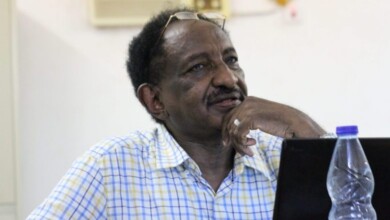The Curve
Dr. Wagdi Kamel

It seems that glory on the battlefield is no longer the sole domain of the rifle, as the Commander-in-Chief of the Sudanese Armed Forces (SAF) responded, and kept repeating, denouncing the revolution and the revolutionaries’ efforts, revealing his true political face. Rather, glory-today- is reserved for drones and advanced weapons technology.
With utter conviction, i write these words, believing that whoever masters technology, especially military technology, will have the upper hand in this war, if its not resolved politically or through negotiations.
Advanced military technologies will tip the scales in the ongoing war, especially when combined with massive financial capabilities and a war economy capable of supporting the arms industry as well as financing the arms race. This door is wide open, brimming with products and markets: some we know, others we have never heard of, and more we are yet to be acquainted with.
Its rather clear that the Sudanese Army, along with its regional backers, won’t be able to sustain a costly technological race for long, given its limited financial resources and the exhaustion of its hijacked economy, the revenues of which are smuggled.
The recent drone strikes on sites in Port Sudan, El-Obeid, and before them Kassala, Kosti, and even the Merowe Dam, cannot be considered outside the context of the technological advancements achieved by the Rapid Support Forces (RSF), due to its greater financial capabilities, compared to the Sudanese Army, which still relies on a limited Air Force, less efficient drones, and manpower dispersed amongst militias with multiple loyalties.
We are witnessing a decisive shift in the course of the conflict, where technology is becoming the differentiating factor, and intensive strikes targeting the most important points of both parties to the conflict, loom. The Sudanese Army, which has long threatened to use “lethal” weapons, may find itself forced to cross all red lines, including civilian lives, especially after previous indications of the possible use of chemical weapons, the effects of which were evident in the charring of some corpses.
As for the Rapid Support Forces, “following the confrontation between them and the Port Sudan regime before the International Court of Justice,” they will not stand idly by. Rather, they will continue to seek to widen the technological gap, especially in the field of advanced drones, in addition to dragging Israel into the battle to counter Iranian and Turkish influence, which portends a catastrophic outcome that could turn large swathes of the country into ruins.
Historically, major wars have proven that military technology is the deciding factor. In World War II, the United States’ development of the atomic bomb was the decisive factor in ending the war in favor of the Allies. In the (1991) Gulf War, the accuracy of cruise missiles and American air superiority demonstrated how a war can be decided from the air before it begins on the ground. Likewise, in the (2020) Nagorno-Karabakh War, Turkish Bayraktar TB2 drones decided the battle in Azerbaijan’s favor, despite Armenia’s possession of strong conventional ground forces.
As General Napoleon Bonaparte stated, “Modern wars are won as much by their engineers as by their soldiers.” In our time, we might believe that those who own and program advanced drones may be more capable of achieving victory than those who carry weapons in the streets and public squares of cities and villages, terrorizing innocents with their takbir (chanting ‘Allah is Great’) and media propaganda. May Allah prove the “disgrace” to be false.





